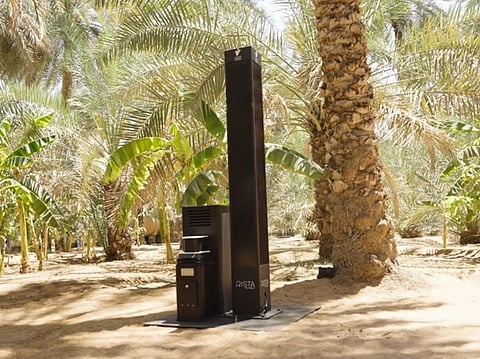Abu Dhabi’s smart mosquito traps set new standards with 400% efficiency boost
Traps use advanced technology to mimics human body emissions to attract female mosquitoes

The Abu Dhabi Public Health Center (ADPHC) has successfully implemented a cutting-edge smart mosquito trap model, marking a major milestone in its commitment to sustainability and innovation in public health protection. These smart traps represent a paradigm shift in how mosquito populations are monitored, tracked, and controlled.
This initiative comes in response to growing challenges posed by climate change, urban expansion, increased travel, and the spread of insecticide-resistant mosquito species. The traps utilize advanced technology that mimics human body emissions to attract female mosquitoes seeking blood. They release carbon dioxide and a synthetic human scent to lure mosquitoes, which are then drawn in by a fan and captured in a collection net — all without the use of chemical agents.
Equipped with sensors and wireless data transmission systems, the traps send real-time data — including mosquito counts, temperature, humidity, and timestamps — to a centralized cloud database. This information is analyzed using artificial intelligence tools and provided to control teams, enabling informed, timely decisions based on mosquito behavioral patterns and environmental shifts.
400% increase in mosquito capture efficiency
These smart traps represent a major advancement in entomological epidemiology. For the first time, they offer the ability to track mosquito population growth and analyze daily and seasonal activity patterns with unprecedented precision, taking into account environmental factors such as high temperatures and humidity.
Since their deployment in Abu Dhabi in 2020, the traps have shown remarkable results, increasing mosquito capture efficiency by over 400%. The average mosquito count per trap rose from 60 in traditional traps to over 240 in smart traps. This technological advancement has led to a 42% reduction in recorded breeding sites and a notable decline in active mosquito reproduction zones in 2024.
A key advantage of these traps is their dual function: beyond detection, they serve as analytical tools to track changes in mosquito behavior over time. This insight has opened new avenues for vector-borne disease research, particularly in predicting outbreaks of diseases such as dengue fever, malaria, and the Zika virus based on breeding patterns.
31% reduction in insecticide use
The precision of these traps has enabled better targeting of control efforts, resulting in a significant reduction in insecticide usage. The volume of insecticides used dropped by 31% — from 7.5 tons in 2019 to 5.3 tons in 2024. This reduction has positively impacted the environment by minimizing exposure to non-target insects like bees, butterflies, and other beneficial arthropods, thereby supporting biodiversity in both urban and agricultural areas.
Since the launch of experimental research in 2019, Abu Dhabi has built an integrated network of more than 920 smart traps covering residential, agricultural, and industrial zones. These traps provide real-time data, making the network one of the most advanced and accurate mosquito surveillance systems in the world. The total operational cost over six years has been approximately AED 12 million, demonstrating a high return on investment in terms of environmental, health, and economic benefits.
A pillar of green and integrated pest control
Smart traps play a vital role in implementing an integrated pest management system for public health, promoting eco-friendly “green control” by reducing the reliance on chemical insecticides and enabling predictive mosquito control. They help detect breeding sites and curb mosquito populations through state-of-the-art tracking and surveillance technologies.
Powered by clean energy, these traps offer continuous 24/7 mosquito monitoring, providing a clear picture of insect spread. As a result, they contribute to more effective preventive public health interventions, aligning with Abu Dhabi’s vision for sustainable, innovative, and health-centric urban development.


